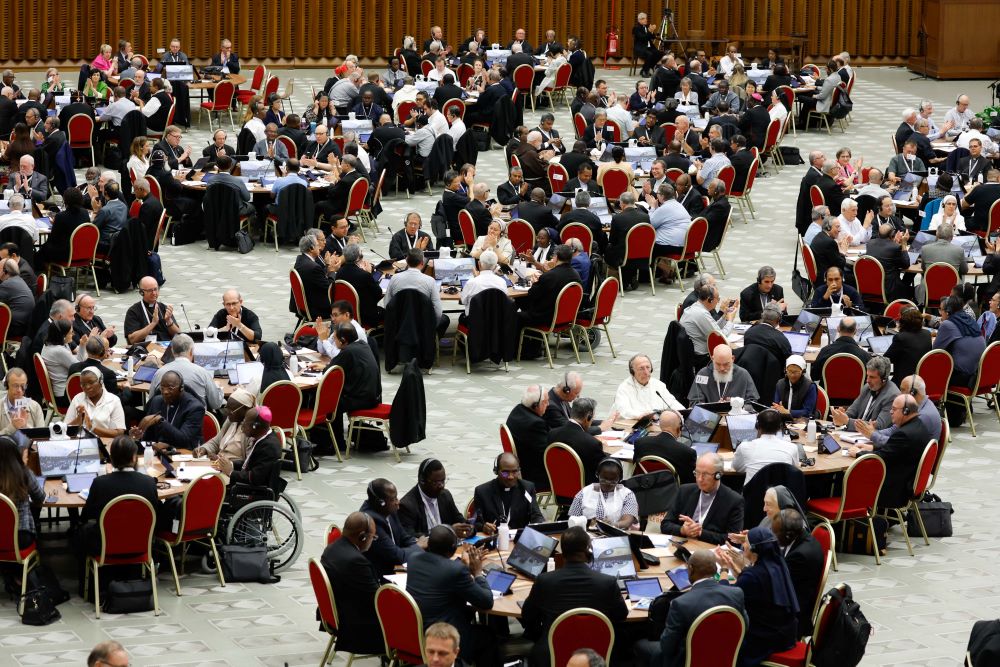
Members of the assembly of the Synod of Bishops start a working session in the Vatican's Paul VI Audience Hall Oct. 18. The synod on synodality runs through Oct. 29. (CNS/Lola Gomez)
I remember exactly where I was when I learned that Jorge Mario Bergoglio had been elected as the 266th pope. I was running on a treadmill in the basement of a building on our motherhouse campus at St. Mary-of-the-Woods, Indiana. It was during my year as a volunteer at the White Violet Center, our congregation's organic farm. I was just dipping my toes into serious discernment about religious life. The TV was on in the corner, and I watched the news coverage about our newly elected pope with equal parts intrigue and skepticism as my feet pounded a rhythm on the black conveyer belt beneath me. "So what?" I remember thinking. "Another old white guy in leadership. What's gonna change?"
Of course, at that point, I had no idea just how groundbreaking it was that the College of Cardinals had chosen someone from the Global South to be pope, or the fact that this was the first pope to choose the name Francis. I was certainly touched by Pope Francis' simplicity and humility, which showed from his very first papal rituals, including his choices of what to wear and his request that the people of God bless him and not the other way around. Still, there was something in me that scoffed at the idea that one human being could really bring change to our big, beautiful, slow-as-molasses Catholic Church.
As I look back, I can see how my 26-year-old self lacked some nuance, but I think her instinct about the source of lasting, substantive change was on the right track. Maybe her jadedness had less to do with believing whether change in such a large institution is possible and more to do with where it comes from. It's about the collective.
This synodal process is a path that we are all making.
The collective may move at a slower pace, but it is powerful, and its impact is long lasting. This is a lesson I have learned over and over in my life, starting with the Scriptures. For example, Moses would have looked a little silly parting the waters for just himself and his wife, Zipporah. The liberation of the Israelites was a story about the collective. It was powerful because it was a groundswell movement that changed everything for both the Israelites and the Egyptians who held them captive. Each prophet in the Hebrew Scriptures spoke on their own, but their voices echo more powerfully within a lineage of a collective tradition, each one building off of another. Some believe that part of the miracle of Jesus feeding the 5,000 can be attributed to the collective decision those gathered made that day to share what each one had.
I also remember learning about the impact of collective action on church tradition during my Vatican II class as a novice. My teacher, a Sister of Providence and a canon lawyer herself, explained to me that there is a provision in Canon Law called "custom." According to the law of the Catholic Church, once certain acts are repeated constantly and consistently for a period of time, they can become incorporated into accepted common rituals and, if certified by a legal church authority, even canon law.
My teacher explained that often these practices begin without any formal permission from church authority. They are an expression of what the community itself wants to do or how they want to be together. For example, the practice of decorating the Church for Christmas or Easter, or the posture of the faithful during the Mass when we pray the "Our Father." After the community practices these rituals collectively for 30 years, they can become officially recognized as "customs." Which is to say, certain traditions or customs that the people of God embrace as a collective over time become a practice that is acceptable both to the people of the community and the church authorities.
I found this concept of "custom" fascinating, a little scary, and also empowering. Now, I'm not a canon lawyer, but simply the idea that the people of God as a collective can have this influence on the Catholic institution encouraged me.
Advertisement
As I have watched the unfolding Synod on Synodality, I keep thinking back to my skepticism that 2013 day on the treadmill and the power of the collective. We, as followers of a God so often made manifest through collective liberation, don't have to wait for top-down change. In the words of Spanish poet Antonio Machado, "se hace camino al andar" — "you make the path by walking it." This synodal process is a path that we are all making.
As I've perused documents and reports from the Synod on Synodality, I have been greatly encouraged. I have found topics that matter to me and my loved ones included in North America's continental document and even the Instrumentum Laboris, the text informing the General Assembly of the Synod of Bishops Oct. 4-29. While my skeptic self doesn't want to get too excited about what it might mean to really enlarge the space of our tents, as we have been invited to consider throughout this process, my belief in the collective keeps me hoping.
The synod participants have been discussing three core questions this month:
- How can we be more fully a sign and instrument of union with God and of the unity of all humanity?
- How can we better share gifts and tasks in the service of the Gospel?
- What processes, structures and institutions are needed in a missionary synodal church?
Sharing our gifts, fostering union with God and others, and embracing a synodal church are all collective work. Whether we are in the room where further deliberations on synod topics are happening and a formal response is being crafted or we are praying in the quiet of our homes, we can ask ourselves, our families, our congregations these questions. Our prayer and our energy can contribute to this collective work.





